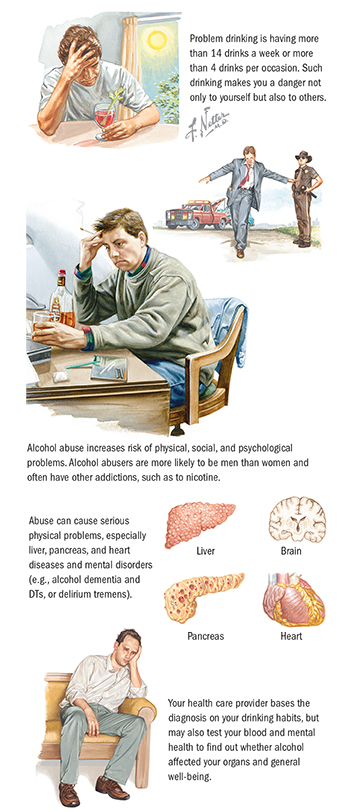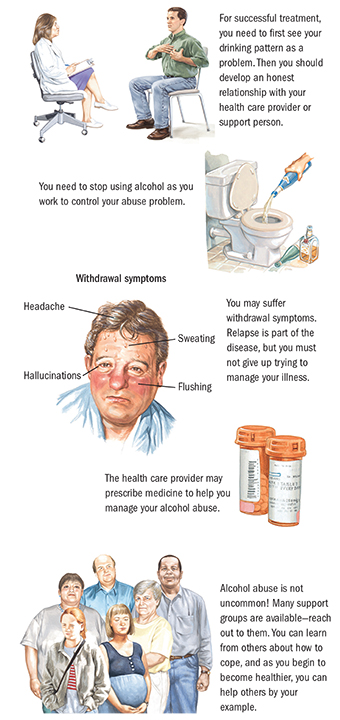
Alcohol abuse occurs when a man often drinks alcohol in amounts more than recommended. Problem drinking in men is having more than 14 drinks weekly or more than 4 drinks per occasion. More than 5 or 6 drinks daily is called heavy drinking. One drink equals one 12-oz bottle of beer, one 5-oz glass of wine, or 1.5 oz of 80-proof liquor. Alcohol abuse can manifest with heavy drinking, with immediate effects of drunkenness; and physically dependent alcoholism, with continuous drinking and serious outcomes of long-term drinking.
Alcohol ranks as one of the four most common causes of death in the United States.
Certain men prone to developing alcoholism are more likely to have relatives with alcoholism. They are also more prone to other addictions (e.g., to nicotine).
Alcohol abuse is often difficult to diagnose. People may deny that they have a problem or try to hide symptoms. Symptoms may be behavioral, physical, or psychological. Behavioral symptoms include feeling guilty and annoyed, being unable to stop drinking after starting, missing work or appointments, hurting yourself or others, and not remembering what was done while drinking. Physical symptoms can occur at once or be illnesses from long-term alcohol damage. These symptoms include unsteadiness, nausea, stomach pains, diarrhea, vomiting, sweating, palpitations, blackouts, and jaundice. Psychological symptoms include mood swings, depression, anxiety, poor sleeping, and forgetfulness.
The health care provider usually diagnoses alcoholism from the medical history. The health care provider may suggest blood tests to see whether alcohol affected the blood, kidneys, liver, metabolism, and general health.

Successful treatment first requires a belief that a problem exists. Treatment often involves following a 12-step recovery plan (Alcoholics Anonymous, or AA) that includes abstinence, education, detoxification (withdrawal from drinking), and peer group support. Help with housing, jobs, social supports, other medical conditions, and coping skills is important. Detoxification may cause unpleasant symptoms, such as sweating and confusion. The health care provider can help with detoxification. Medicines used for treatment include benzodiazepines to calm you down and other medications to reduce your craving for alcohol.
Stopping alcohol abuse is difficult. Men often relapse after treatment. However, they must accept that relapse is part of the illness and work toward abstinence again.
Contact the following sources:
The best place to get additional information about alcoholism is at your local AA central office. In addition, most mental health centers can also be of some assistance, or you can check out the following websites.
Copyright © 2016 by Saunders, an imprint of Elsevier, Inc.
Ferri’s Netter Patient Advisor